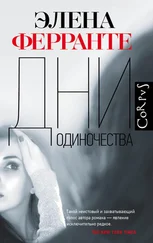“I’m not giving you anything,” I said. “Either you take me home or I get out and go.”
He stared into my eyes for a very long time, then started the engine.
“You’re the boss.”
11.
I discovered that the boys in my class also talked with interest about my large breasts. My deskmate, Mirella, told me, adding that a friend of hers who was a year ahead of us—his name was Silvestro, I remember, and he had a certain renown because he came to school on a motorbike that made everyone envious—had said in the courtyard, in a loud voice: her ass isn’t bad, either, just put a pillow over her face and you’d have a great fuck.
I didn’t sleep that night, I wept in humiliation and rage. I felt like telling my father, an irritating thought left over from childhood, as a child I had imagined that he would confront any problem I had and solve it. But right afterward I thought of my mother, who had almost no bosom, and of Costanza, who had a round, full one, and said to myself that surely my father liked women’s breasts even more than Silvestro, Corrado, Rosario. He was like all men, and if I hadn’t been his daughter he would undoubtedly have talked about Vittoria in my presence with exactly the same contempt with which Silvestro had talked about me, he would have said she was ugly but had an enormous bosom, a firm ass, and Enzo must have put a pillow over her face. Poor Vittoria, to have my father for a brother: how rough men were, how brutal in every word they dedicated to love. They liked humiliating us, dragging us along their lewd path. I was discouraged, and in lightning flashes—even today, in moments of suffering I feel as if I had an electrical storm in my head—I went so far as to ask myself if Roberto was like that, if he expressed himself that way. It didn’t seem possible, and the mere fact that I had posed the question made me feel even worse. Surely, I thought, he speaks to Giuliana with gentle words and of course he desires her, but he desires her sweetly. I finally calmed down by imagining how gracious their relationship must be and vowing to find a way to love them both and all my life be the person to whom they would confide everything. Enough of bosom, ass, pillow. Who in the world was Silvestro, what did he know about me, he wasn’t even a brother who’d seen me as a child and knew the dailiness of my body, luckily I had no brothers. How could he have dared to talk like that, in front of everyone.
I calmed down, but it took days for Mirella’s revelation to fade. One morning I was in class with my mind free of troubles. While I was sharpening a pencil, the bell for recess rang. I went into the hall and found myself facing Silvestro. He was a large kid, a lot taller than me, with very pale freckled skin. It was hot, he was wearing a short-sleeved yellow shirt. Without thinking I struck his arm with the point of my pencil, launching it with all my strength. And he screamed, a long scream like a seagull’s, and staring at his arm said: the point’s still in there. He started crying, I exclaimed, I was pushed, sorry, I didn’t do it on purpose. I looked at the pencil: I muttered, the point really broke, let me see.
I was amazed. If I’d had a knife in my hands, what would I have done, would I have stuck it in his arm, or where? Silvestro, supported by his friends, dragged me to the principal, and I continued to defend myself even to her, swearing that someone had shoved me during the scuffle at recess. It seemed too humiliating to tell the story of the large bosom and the pillow, I couldn’t bear to seem like a girl who’s ugly and won’t admit it. When it was clear that Mirella wouldn’t speak up to explain my reasons I was really relieved. It was an accident, I repeated endlessly. The principal gradually got Silvestro to calm down, and summoned my parents.
12.
My mother took it in the worst way. She knew I had started studying again, and the decision I’d made to take the exam to make up my repeated year was important to her. This stupid matter seemed to her yet another betrayal, maybe it confirmed for her that, since my father’s departure, neither of us had been able to live with dignity. She murmured that we had to protect what we were, we had to be aware of ourselves. And she got angry, angry in a way she never was, but not with me, now she obsessively traced every trouble of mine back to Vittoria. She said that in this way I was supporting her, that my aunt wanted to make me like her in my behavior, in my words, in everything. Her small eyes sank further into her face, her bones seemed to be nearly breaking the skin. She said slowly: she wants to use you to prove that your father and I are all appearance, that while we have risen a little, you will plummet, and everything will even out. She then went to the telephone and reported everything to her ex-husband, but while with me she had lost her calm, with him she regained it. She spoke to him in a very low voice, as if between them there were agreements from which the more I threatened to violate them with my bad behavior, the more forcefully I was excluded. I thought, with a sense of desolation: everything is so disconnected, I try to hold the pieces together and I can’t, there’s something about me that doesn’t work, we’ve all got something in us that doesn’t work, except Roberto and Giuliana. Meanwhile my mother was saying on the phone: please, you go. And she repeated it several times: all right, you’re right, I know you’re busy, but please, go. When she hung up I said bitterly:
“I don’t want Papa to go to the principal.”
She answered:
“Quiet, you want what we want.”
It was known that the principal, while she was indulgent toward those who listened to her little speeches in silence and said a few words of reproach to their offspring, became harsh with parents who defended their children. I was sure that I could trust my mother, she had always managed very well with the principal. But my father had stated on several occasions, sometimes even lightheartedly, that anything that had to do with the scholastic world irritated him—colleagues put him in a bad mood, he despised hierarchies, the rites of collegial bodies—and so he was always wary of setting foot in my school in the guise of parent, he knew that he would surely be harmful to me. But this time he was punctual, at the end of the school day. I saw him in the hall and joined him reluctantly. I muttered anxiously, with a deliberately Neapolitan cadence: Papa, I really didn’t do it on purpose, but it’s better if you put the blame on me, otherwise it will go badly. He told me not to worry and, once in the presence of the principal, he was very cordial. He listened to her attentively when she told him in detail how difficult it was to run a high school, he told her in turn a little story about the ignorance of the local superintendent, he complimented her out of the blue on how nice her earrings looked. The principal narrowed her eyes, pleased, struck the air lightly with her hand as if to chase him away, laughed, and with that same hand covered her mouth. Only when it seemed as if they would never stop the chitchat, my father returned abruptly to my bad behavior. To my astonishment, he said that certainly I had hit Silvestro on purpose, he knew me well, and if I had reacted like that I had a good reason for it, he didn’t know what that good reason was and didn’t want to know, but he had learned long ago that in the scuffles between boys and girls boys are always wrong and girls always right, and that even if that wasn’t the case this time, boys should still be brought up to assume their responsibilities, even when they appeared to have none. Naturally, this is an approximate summary, my father spoke at length and his phrases were fascinating and finely honed, the sort of discourse that is so elegantly formulated it amazes you, and at the same time it’s pronounced with unquestionable authority, and you understand that it admits no objections.
Читать дальше

![Элена Ферранте - История о пропавшем ребенке [litres]](/books/32091/elena-ferrante-istoriya-o-propavshem-rebenke-litres-thumb.webp)
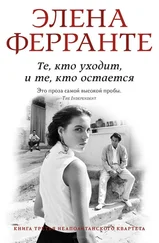
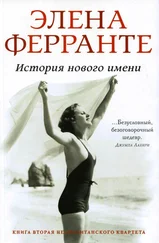
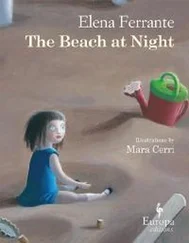
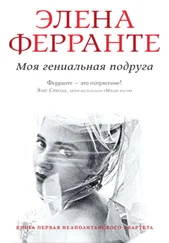
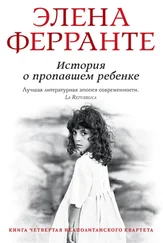
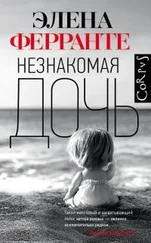
![Элена Ферранте - Дни одиночества [litres]](/books/404671/elena-ferrante-dni-odinochestva-litres-thumb.webp)


